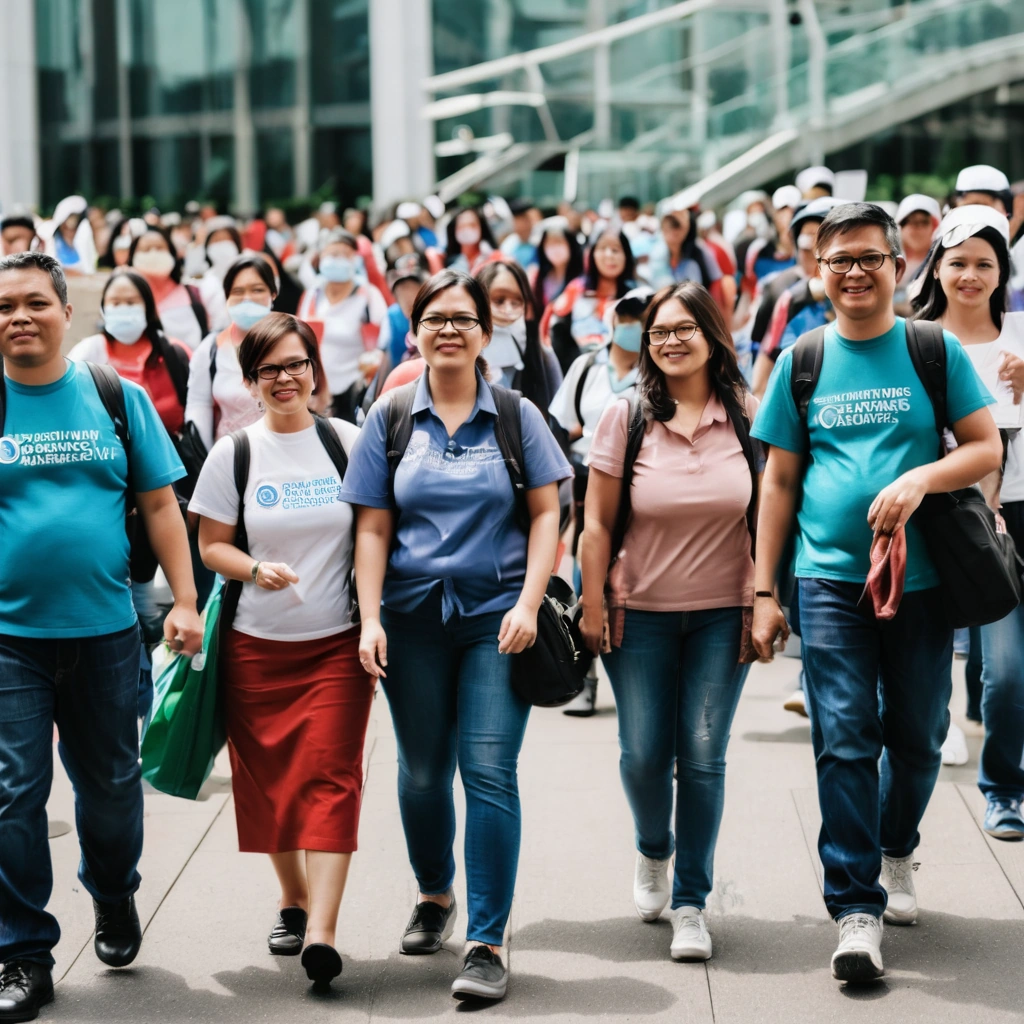Comprehensive Guide to OFW Support: Navigating Advocacy Organizations and Resources
Introduction: Navigating the Complexities of OFW Life
Overseas Filipino Workers (OFWs), hailed as the modern-day heroes of the Philippines, contribute significantly to the nation’s economy through their remittances. However, their journey is often fraught with challenges, ranging from unfair labor practices and cultural adjustments to emotional distress and financial exploitation. Navigating these complexities requires access to reliable support systems and OFW advocacy organizations dedicated to protecting their rights and promoting their welfare. This guide serves as a comprehensive resource for OFWs, outlining key organizations, their missions, eligibility criteria, and practical tips for a safer and more secure overseas experience.
In an era increasingly shaped by artificial intelligence, understanding how these resources can be augmented and accessed through technology is also crucial. The economic contributions of overseas Filipino workers are undeniable, yet the individual struggles faced often remain obscured. Beyond the remittances that bolster the Philippine economy, many overseas Filipino workers encounter systemic issues that demand comprehensive OFW support. These challenges range from illegal recruitment practices, where unscrupulous agencies exploit vulnerable individuals, to contract violations that leave OFWs underpaid and overworked.
Moreover, migrant workers rights are frequently compromised due to a lack of awareness or access to legal aid, leaving them susceptible to abuse and exploitation. Addressing these multifaceted issues requires a concerted effort from government agencies, non-governmental organizations, and the OFWs themselves, leveraging available OFW resources to ensure their protection and well-being. Financial literacy for overseas workers is paramount to ensuring long-term security and preventing exploitation. Many OFWs, despite earning significantly more abroad than they would at home, fall prey to financial scams or fail to adequately plan for their future.
Assistance for OFWs should include comprehensive financial education programs that cover topics such as budgeting, saving, investing, and debt management. These programs should also address the specific challenges faced by OFWs, such as remittance fees and exchange rate fluctuations. Furthermore, promoting financial literacy empowers OFWs to make informed decisions about their earnings, enabling them to build a more secure future for themselves and their families, and reducing their vulnerability to financial predators. Legal challenges and support mechanisms are critical components of OFW protection.
Overseas Filipino workers often face complex legal issues, ranging from labor disputes to immigration problems. Access to timely and effective legal aid is essential to ensuring that their rights are protected. Organizations like OWWA and POEA play a crucial role in providing legal assistance, repatriation services, and welfare assistance to OFWs in distress. However, more needs to be done to raise awareness of available legal resources and to streamline the process of accessing them. Empowering OFWs with knowledge of their rights and providing them with accessible legal support is crucial for navigating the often-treacherous landscape of overseas employment.
Key Advocacy Organizations and Their Missions
Numerous organizations are pivotal in championing migrant workers rights and delivering crucial assistance for OFWs. The Overseas Workers Welfare Administration (OWWA), a government agency, anchors its OFW support by providing welfare services, skills training programs designed for overseas Filipino workers, and comprehensive reintegration initiatives. OWWA’s core mission centers on safeguarding the interests and enhancing the overall well-being of OFWs and their families, providing a safety net against the vulnerabilities inherent in overseas employment. The Philippine Overseas Employment Administration (POEA) plays a complementary role by regulating recruitment agencies and enforcing ethical hiring practices, acting as a gatekeeper to prevent exploitation at the initial stages of overseas employment.
Both OWWA and POEA are critical components of the Philippine government’s strategy to protect its overseas workforce. Beyond governmental efforts, non-governmental organizations (NGOs) significantly augment OFW advocacy. The Blas F. Ople Policy Center, for example, offers legal aid, repatriation assistance to distressed OFWs, and general welfare support, directly addressing the immediate needs of vulnerable workers. Simultaneously, the Center for Migrant Advocacy Philippines (CMA) concentrates on broader policy advocacy and empowering migrant communities through education and rights awareness programs.
These organizations often specialize in distinct areas of OFW support; some prioritize legal recourse for contract violations or abuse cases, while others focus on providing financial literacy training to ensure overseas Filipino workers can effectively manage their remittances and plan for their future. Such specialization allows for a more targeted and effective allocation of resources. In addition to direct aid and advocacy, several organizations are increasingly focused on preventative measures and long-term financial stability for OFWs.
Recognizing that financial literacy is crucial for long-term well-being, many NGOs and even OWWA offer training programs designed to equip overseas Filipino workers with the skills to budget, save, invest, and avoid predatory lending practices. These initiatives aim to empower OFWs to make informed financial decisions, secure their economic future upon returning to the Philippines, and break the cycle of dependence on overseas employment. Furthermore, some organizations are exploring innovative approaches, such as leveraging technology to provide accessible and affordable financial services tailored to the unique needs of overseas Filipino workers and their families. By combining direct assistance with proactive education and empowerment, these organizations contribute to a more sustainable and equitable future for overseas Filipino workers.
Eligibility and Application Processes for Support Services
Accessing OFW support services from advocacy organizations typically involves navigating specific eligibility criteria and adhering to defined application processes, a critical step for overseas Filipino workers seeking assistance. For OWWA benefits, a cornerstone of OFW advocacy, active membership with updated contributions is paramount. This often necessitates providing verifiable proof of employment, an OWWA membership ID, and passport copies. The application processes are not uniform; they are tailored to the type of assistance needed, ranging from streamlined online applications for skills training programs designed to enhance financial literacy for overseas workers, to in-person consultations for complex legal aid concerning migrant workers rights.
Navigating these requirements can be daunting, highlighting the need for readily available OFW resources. NGOs, complementing governmental efforts, often have distinct eligibility criteria, frequently prioritizing vulnerability factors such as experiences of illegal recruitment, breaches of contract, or documented abuse. Gaining a clear understanding of these specific requirements and procedures is crucial; therefore, direct communication with the organization is essential. The POEA also plays a role, often requiring specific documentation related to employment contracts. Understanding the nuances of each organization’s requirements ensures that overseas Filipino workers can efficiently access the assistance for OFWs they desperately need, including repatriation support in dire circumstances.
Early engagement can be transformative, preventing minor issues from escalating into full-blown crises. Furthermore, many organizations now offer preliminary eligibility assessments online or via telephone hotlines. These assessments can save applicants considerable time and effort by providing an initial indication of whether they meet the core criteria. Beyond documentary requirements, some programs may also involve interviews or assessments to evaluate the applicant’s needs and suitability for the particular service. For instance, welfare assistance programs might require a social worker’s assessment to determine the level of financial or emotional support needed. By understanding the comprehensive requirements, overseas Filipino workers can better prepare their applications and increase their chances of receiving the crucial support they deserve.
Addressing Common Challenges Faced by OFWs
Overseas Filipino Workers (OFWs) encounter a myriad of challenges that demand comprehensive OFW support, ranging from the deceptive practices of illegal recruitment to the harsh realities of contract violations, wage theft, and instances of physical or emotional abuse. OFW advocacy organizations are crucial in addressing these issues through multifaceted interventions designed to protect migrant workers rights. Legal aid services stand as a vital resource, providing legal representation and expert advice to OFWs embroiled in labor disputes or facing criminal charges in foreign lands.
These services ensure that overseas Filipino workers have access to justice, safeguarding them against exploitation and unfair treatment under unfamiliar legal systems. The POEA plays a role in regulating recruitment agencies, but legal aid fills the gap when prevention fails. Welfare assistance programs offer a lifeline to distressed OFWs, providing essential financial support to cover immediate needs such as food and shelter, counseling services to address emotional and psychological distress, and temporary shelter for those who have been displaced or are awaiting repatriation.
These programs are often coordinated with OWWA to ensure comprehensive assistance for OFWs in crisis. Repatriation assistance facilitates the safe and dignified return of OFWs to the Philippines, particularly in cases of emergency, abandonment, or crisis situations where their well-being is at risk. Assistance for OFWs also extends to helping them navigate the complex process of reintegration into Philippine society, offering resources for finding employment and rebuilding their lives. Beyond direct assistance, many organizations actively engage in policy advocacy, striving to strengthen legal protections for migrant workers rights at both the national and international levels.
This includes lobbying for stronger enforcement of labor laws, advocating for fair and ethical recruitment practices, and promoting international agreements that safeguard the rights and welfare of OFWs. The recent focus on tailored support for vulnerable groups, exemplified by initiatives addressing the needs of LGBTQ+ individuals, underscores the importance of culturally sensitive and inclusive OFW resources. Addressing the unique challenges faced by specific OFW populations, such as those experiencing discrimination or abuse based on gender, sexual orientation, or ethnicity, is critical for ensuring that all overseas Filipino workers receive the comprehensive support they deserve. Proactive measures, combined with robust assistance programs, are essential for empowering OFWs and protecting their rights throughout their overseas employment journey.
Practical Tips for Proactive Protection
Proactive measures are essential for overseas Filipino workers to safeguard their rights and well-being throughout their employment journey. Before departing for overseas work, thorough due diligence is paramount. Research potential employers and recruitment agencies meticulously. Verify their accreditation with the Philippine Overseas Employment Administration (POEA), cross-referencing their records against any history of complaints or violations. OFWs should utilize online resources and government databases to access this information, treating the selection of an employer with the same scrutiny as a major financial decision.
This initial investigation serves as a critical first line of defense against exploitation and unfair labor practices, ensuring that overseas Filipino workers (OFWs) are entering into legitimate and ethical employment arrangements. This also ties into financial literacy, as avoiding illegal recruiters saves significant money and potential debt. Understanding the nuances of your employment contract is equally crucial. Scrutinize every clause to ensure it aligns with Philippine labor laws and international standards, particularly those related to working hours, wages, termination policies, and repatriation rights.
Seek clarification from legal aid organizations or OFW support groups if any terms are unclear or seem unfavorable. Never sign a contract under duress or without fully comprehending its implications. Remember that the contract is a legally binding document that outlines your rights and responsibilities, and a thorough understanding can prevent future disputes and protect you from potential exploitation. Many instances of wage theft and contract violations stem from a lack of understanding of the contract’s terms, highlighting the importance of pre-departure education.
Maintaining consistent and open communication with family back home is vital for emotional support and serves as a safety net during challenging times. Share your experiences, both positive and negative, and seek their advice and encouragement. Furthermore, connect with established OFW communities in your host country. These networks provide invaluable peer support, cultural familiarity, and access to local resources. Sharing experiences and information within these communities can help OFWs navigate cultural adjustments, address workplace issues, and access assistance for OFWs when needed.
These communities often serve as the first point of contact for OFWs facing difficulties, offering practical advice and emotional support. To further protect your interests, meticulously document all work-related incidents, including any contract violations, instances of abuse, or safety concerns. Maintain a detailed record of working hours, wages received, and any deductions made. Preserve copies of your employment contract, visa, and other important documents in a secure and accessible location. This documentation will be invaluable if you need to file a complaint or seek legal recourse.
Save contact information for Philippine embassies, consulates, and reputable OFW advocacy organizations in your host country. These entities can provide crucial assistance in cases of emergency, legal disputes, or repatriation needs. Regularly update your Overseas Workers Welfare Administration (OWWA) membership and actively participate in pre-departure orientation seminars (PDOS) to stay informed about your rights and available resources. These seminars often provide essential information on financial management, cultural adaptation, and legal protections, equipping OFWs with the knowledge and skills to navigate their overseas employment successfully.
Finally, be a discerning consumer of recruitment and employment services. Demand transparency and accountability from recruitment agencies. Be wary of agencies that charge excessive fees or make unrealistic promises. Report any suspected illegal recruitment activities to the POEA. Consider leveraging digital tools and online platforms to research reputable agencies and connect with other OFWs who can share their experiences. Actively seek out and participate in financial literacy programs designed for overseas Filipino workers. Understanding basic financial principles, budgeting, saving, and investment strategies can empower you to manage your remittances effectively and secure your financial future. By embracing proactive measures and staying informed, overseas Filipino workers can significantly mitigate risks, protect their rights, and maximize the benefits of their overseas employment.
Directory of Reputable Organizations
Below is a directory of reputable organizations offering OFW support. Please note that contact information may change, so it’s always best to verify details directly with the organization. These entities are crucial pillars in upholding migrant workers rights and providing much-needed assistance for OFWs navigating the complexities of working abroad. The Overseas Workers Welfare Administration (OWWA), accessible at owwa.gov.ph, is a primary government agency providing a comprehensive suite of OFW resources. This includes welfare assistance, skills training programs designed for reintegration, and repatriation assistance when overseas Filipino workers face dire circumstances.
Always check their website for the most current contact information and updates on available programs. Similarly, the Philippine Overseas Employment Administration (POEA), found at poea.gov.ph, plays a vital role in regulating recruitment agencies and ensuring ethical hiring practices. OFWs can verify the legitimacy of job offers and recruitment agencies through the POEA to avoid illegal recruitment, a significant challenge faced by many. Beyond government agencies, several non-governmental organizations (NGOs) offer invaluable OFW advocacy and legal aid.
The Blas F. Ople Policy Center is known for its proactive stance on migrant workers rights and its work in assisting distressed OFWs. The Center for Migrant Advocacy Philippines (CMA) provides crucial support and advocacy, often focusing on policy reforms and legal challenges faced by overseas Filipino workers. Given the dynamic nature of NGO operations, it is advisable to conduct an online search to obtain the most current contact information for these organizations. Finally, Philippine Embassies and Consulates worldwide serve as vital points of contact for OFWs needing assistance.
These diplomatic missions offer a range of services, including legal aid, welfare assistance, and repatriation support. Contact information for specific countries can be found through the Department of Foreign Affairs website. It’s essential for every OFW to know the location and contact details of the nearest Philippine Embassy or Consulate in their host country as a first point of contact in case of emergencies or legal issues. These organizations collectively form a critical safety net, offering diverse forms of OFW support to help navigate the challenges of overseas employment.
Conclusion: A Collective Effort for OFW Empowerment
Supporting overseas Filipino workers requires a multi-faceted approach involving government agencies, non-governmental organizations, and, most importantly, the OFWs themselves. By understanding their rights, actively seeking out available OFW resources, and proactively safeguarding their well-being, overseas Filipino workers can navigate the inherent challenges of overseas employment with greater confidence and security. The Overseas Workers Welfare Administration (OWWA) and the Philippine Overseas Employment Administration (POEA) play pivotal roles, but their effectiveness hinges on OFWs’ awareness of their services and eligibility criteria.
Furthermore, sustained OFW advocacy is crucial for holding these agencies accountable and ensuring they adapt to the evolving needs of migrant workers. As technology evolves, leveraging AI-powered tools for information access, legal assistance, and mental health support will become increasingly vital, offering personalized and readily available assistance for OFWs worldwide. The collective effort to empower and protect OFWs ensures they can continue to contribute significantly to the Philippines’ economic progress while leading safe and fulfilling lives abroad.
For example, increased financial literacy programs, tailored to the specific challenges OFWs face, can mitigate the risk of financial exploitation and promote long-term financial security. These programs should cover topics such as budgeting, saving, investing, and debt management, and should be accessible in multiple languages and formats. Moreover, access to legal aid for OFWs facing contract violations, wage theft, or unjust termination is paramount. Strengthening legal support mechanisms and increasing awareness of migrant workers rights are essential steps in protecting OFWs from abuse and exploitation.
Drawing lessons from various advocacy movements, including consumer protection and LGBTQ+ rights, underscores the importance of sustained vigilance and proactive engagement to safeguard the rights and welfare of this vital sector of the Philippine economy. The ongoing struggle for migrant workers rights highlights the need for continuous improvement in OFW support systems, including streamlined repatriation processes, readily available welfare assistance, and effective mechanisms for addressing grievances. Moreover, international collaboration is essential to ensure that OFWs are protected under international labor laws and that host countries uphold their responsibilities in safeguarding the rights and well-being of these vulnerable workers. Ultimately, empowering OFWs requires a holistic approach that addresses their economic, social, and psychological needs, ensuring they are treated with dignity and respect throughout their overseas journey.


